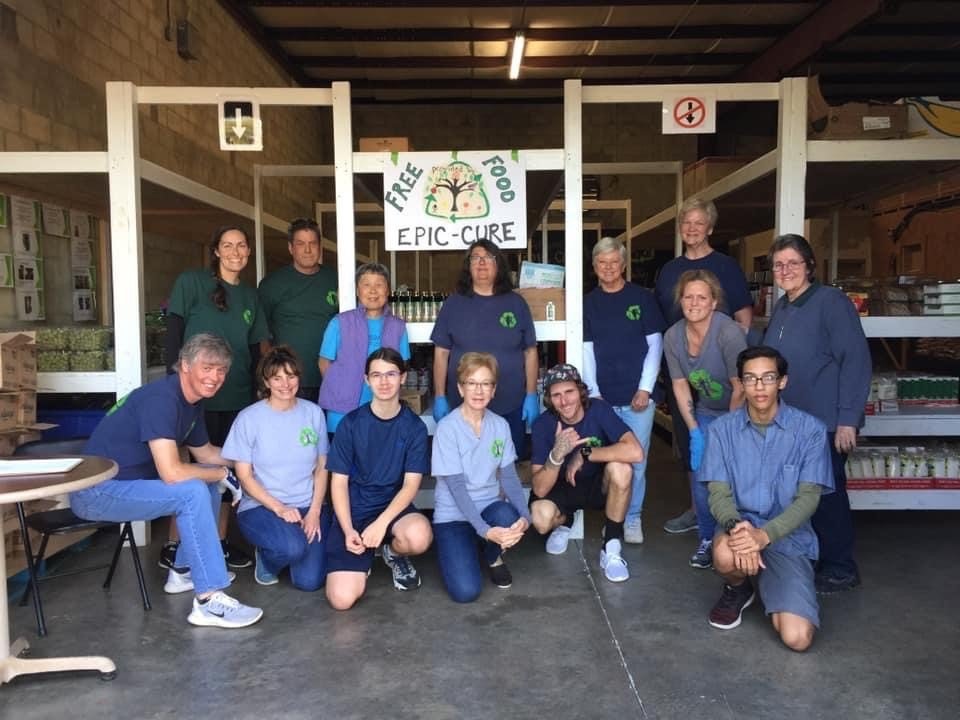Epic-Cure provides more than 300,000 pounds of food in St. Johns, Putnam counties each month
What are the chances that a film could inspire you to start a nonprofit that feeds thousands each week, while continuing to hold another full-time job? That’s exactly what happened in late 2018 after Sunny Mulford of St. Augustine watched the documentary “Wasted! The Story of Food Waste.”
“It changed my life,” Sunny said. “Seeing all that waste and the harm to animals and the environment, we just had to do something about it.”
From there, things quickly moved from concept to reality. Sunny, her husband Ken and daughter Hanna created the food rescue organization they named Epic-Cure in late December 2018 and received nonprofit status from the IRS in February 2019. Next, they secured a 2,500-square-foot warehouse and paid other startup costs with their own funds and matching donations from the Chubb Charitable Foundation. Last May, the first rescued and donated food arrived at Epic-Cure’s warehouse, where clients in need began “shopping” for food items.
Fast forward to today, and Epic-Cure is bursting at the seams, providing more than 300,000 pounds of food a month in northern Florida’s St. Johns and Putnam counties, in large part due to the COVID-19 outbreak.
Epic-Cure works with a variety of organizations, stores, and farms to receive and distribute most types of food items available in grocery stores. Its primary partnership has been with Feeding Northeast Florida, the local chapter of Feeding America. Through the arrangement, Epic-Cure picks up food from a number of Winn-Dixie supermarkets and FNF picks up from Publix, Costco, Whole Foods and Sam’s Club and delivers it to Epic-Cure’s warehouse each week.
However, demand has more than doubled in recent weeks, both from unemployment and because many food security nonprofits in the area have halted operations as their senior-aged volunteers – the most vulnerable to the virus – have prudently remained at home.
Compounded by well-publicized “runs on the stores,” which dropped its deliveries from markets by 70%, Epic-Cure became a partner agency of U.S. Department of Agriculture to help fill the gap. And, as an FNF designated emergency relief food pantry, they agreed to remain open during emergencies, initially seen to be hurricanes but now known to be more, to support their community.
“Our primary goal is food rescue, but our priority is to feed people, so partnering with the USDA helps us meet that immediate need,” Sunny notes.
The coronavirus had temporarily shifted distribution at Epic-Cure’s warehouse to a drive-through approach with safe practices. The phased opening of North Florida’s economy has now seen a phased return to Epic-Cure’s farmer’s market-style free “shopping,” where patrons can choose the food and personal effects that they most want, doing so at a safe distance and using face masks to reduce the risk of infection. In addition, to meet the needs of vulnerable groups, it is now making deliveries to seniors, schoolchildren, veterans and the homeless.
Epic-Cure is completely run by volunteers, many of whom are clients or are connected with partner organizations, with more than 1,700 hours logged in May. The organization has largely been funded by individual donations, although significant grants and donations have come from:
Whole Foods; Florida’s First Coast Relief Fund; Feeding Northeast Florida; Gentry Construction; Burkhardt Distributing Company; The Lewis Greenwood Foundation; Robert W. Baird & Company; Leonardi’s Nursery; and, The Community Foundation of Northeast Florida.
Any food that is not usable or is left over goes to local farms for feeding livestock and composting.







